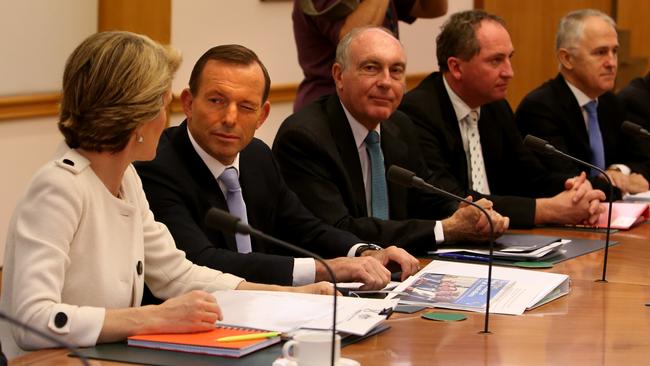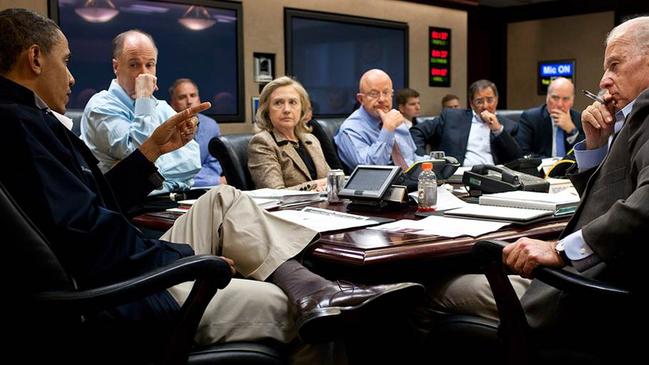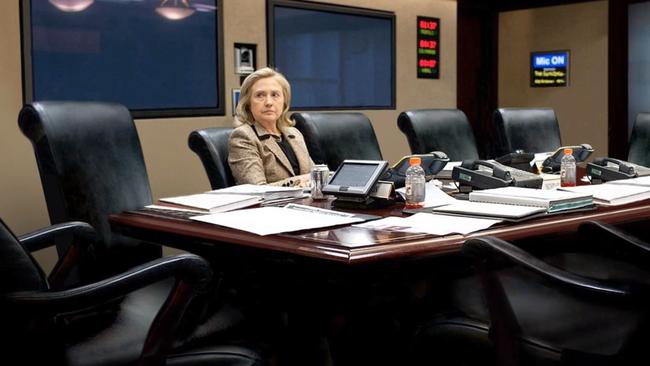Julie Bishop says she was ignored in Abbott’s cabinet because she’s a woman
JULIE Bishop is one of the most powerful women in Australia, and yet even she’s experienced what many other women face every day.
HAVE you ever been in a meeting and thrown out what you thought was a particularly brilliant idea, only to have it entirely ignored? To add insult to injury did the bloke sitting across from you then offer up that very same idea moments later, to rapturous praise?
As it turns out, so has Australia’s Foreign Minister Julie Bishop.
Speaking at the Women’s Weekly Women of the Future event in Sydney yesterday, Ms Bishop reflected on her experience being the only woman in the Abbott Government’s cabinet.
“It was pretty lonely. I would be sitting in a cabinet with 19 men and me,” she told the room. Bishop explained that she’d put forward a new policy or initiative and then? “Nothing. Halfway around the room, a guy will say exactly what I said. Exactly my idea, exactly my initiative, and the others will say ‘Brilliant, what a genius idea’.”
Bishop described the approach of her fellow cabinet members as a kind of unconscious bias, “almost a deafness” to her contribution. Keep in mind we’re talking here about the deputy leader of the Liberal Party, the nation’s first female foreign minister and the only senior politician to retain a leadership role for the entirety of this last turbulent decade in Australian politics.
So how is it possible that someone of Julie Bishop’s standing and achievements is being ignored, interrupted and talked over in meetings? And if it’s happening to her, what hope is there for the rest of us?

The problem, as Bishop herself identified yesterday, is one of unconscious bias. Human beings listen differently depending on who is talking. When we hear various accents or tones of voice or pace of speaking, our brain makes a judgment about the legitimacy and value of what the speaker is saying based on those characteristics. Often the way something is said inhibits our ability to properly consider the substance of the statement.
In the workplace context this can be particularly problematic. That’s because women are still few and far between in the rooms where decisions are made and culture is shaped. This has led to an unconscious assumption — on the part of women and men — that powerful new ideas and strategies are conveyed in a masculine tone of voice. It means we don’t respond as well to those ideas when women present them.
The result is that meetings will routinely ignore or overlook the contribution of women, especially in rooms where women are in the minority. Indeed, one 2014 study of the tech industry showed men were twice as likely to interrupt people than women were and almost three times as likely to interrupt a woman than another man. Meghan Sumner from Standford University has found that “even when a certain female voice is deemed trustworthy, clear, and comprehensible, her voice receives lower ratings when [it’s compared] with a man’s voice”.
But if this behaviour is all unconscious, if human beings do it without even realising, how do we solve the problem?


For women and men, it begins with recognising that the bias exists in the first place and taking the time to reassess your own behaviour. Remember that sexism isn’t the exclusive domain of men. Women suffer from the same unconscious biases that mean they tend to see other women’s contributions as less important. Women may also internalise this bias and start to think their own contribution isn’t worthy of note.
There’s also another strategy for dealing with the problem that Julie Bishop herself has employed to great effect. It’s called ‘Shine Theory’ and it involves women working together to ensure that their voices are heard and that their opinions or ideas are awarded the weight they deserve.
Once Tony Abbott was deposed, the then-new Prime Minister Malcolm Turnbull appointed several more women to the ministry. This meant that Julie Bishop had female colleagues sitting next to her at the cabinet table and they made a deliberate effort to back in one another’s contribution. Every time one of them made a particularly significant point in a meeting, one of the others would reaffirm it, paying credit to the woman whose idea it was. Then another would reinforce the point again, backing her female colleague.
The point would be repeated, rephrased and its original source noted until eventually the group acknowledged it. Bishop joked yesterday “it didn’t matter what the other woman said, the others would go, ‘OMG that is brilliant, did you hear that?’ ”
They became far more powerful together than they ever could have been alone.
Bishop’s experience flies in the face of old-fashioned stereotypes that women are ‘their own worst enemies’ at work. She proves that women can be one another’s greatest allies and supporters in a workplace culture that too often overlooks and undervalues them. Julie Bishop may not call herself a feminist but she sure sounds like she’s living its principles every day of the week — and good on her.
Jamila Rizvi is an author, presenter and regular columnist for news.com.au. Her best-selling book, Not Just Lucky is published by Penguin Random House and is available to purchase now.



